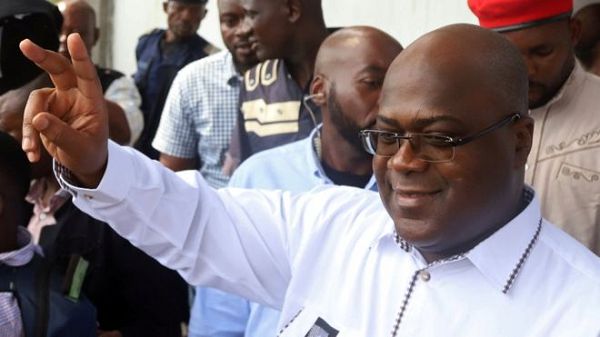
Felix Tshisekedi: Opposition leader named winner in DR Congo poll
Opposition candidate Felix Tshisekedi has won the Democratic Republic of Congo's tightly contested presidential vote, the electoral commission says.
The provisional result puts him ahead of rival opposition candidate Martin Fayulu who has denounced it as a fraud. France has also questioned the outcome.
Advertisement
If confirmed, Mr Tshisekedi will be the first opposition challenger to win since the DR Congo gained independence.
Current President Joseph Kabila is stepping down after 18 years in office.
DR Congo is a country the size of Western Europe and Mr Kabila had promised its first orderly transfer of power since independence from Belgium in 1960.
The election outcome was initially expected to be announced on Sunday. The interim result can still be challenged.
In the early hours of Thursday the head of DR Congo's National Electoral Commission (Ceni), Corneille Nangaa, said Mr Tshisekedi had received 38.5% of the vote and had been "provisionally declared the elected president".
The full results were, with turnout reportedly 48%:
Felix Tshisekedi - 7 million votes
Martin Fayulu - 6.4 million votes
Emmanuel Shadary - 4.4 million votes
What's the reaction been?
Mr Tshisekedi, who is the son of late veteran opposition leader Etienne Tshisekedi, told supporters at his Union for Democracy and Social Progress party headquarters in Kinshasa that Mr Kabila should no longer be seen as a rival.
"I pay tribute to President Joseph Kabila and today we should no longer see him as an adversary, but rather, a partner in democratic change in our country," he said.
Mr Tshisekedi has promised to make the fight against poverty his priority.
Mr Fayulu, a former oil tycoon, dismissed the results as having "nothing to do with the truth".
"The Congolese people will never accept such a fraud," he told the BBC, adding: "Felix Tshisekedi never got 7 million votes. Where did he get them from?" And France appeared to back him.
"We must have clarity on these results, which are the opposite to what we expected," Foreign Minister Yves Le Drian told CNews.
He said the Catholic Church, which had 40,000 observers at the election, had found "completely different" results.
Uncertain future Analysis by Fergal Keane, BBC News, in Kinshasa
Given the deeply polarised nature of politics here, any result was going to leave a divisive aftermath.
Whether Mr Tshisekedi has the intention or the capacity to challenge the powerful hold Mr Kabila enjoys over the army, security services and key ministries will determine whether politics has really entered a new era.
He has already spoken of working with Mr Kabila to ensure the success of democracy.
For Mr Fayulu there are difficulties, too. How does he decide to react?
The most likely route for the moment is to try and challenge the result within the 10-day period parties are allowed under the law.
Given the closeness of the vote, his supporters will point to claims of irregularities in several areas.
Significantly the Church and civil society have called on citizens to avoid becoming involved in violence - a recognition of the dangers involved in street protests while facing security forces with a reputation for heavy-handedness.
On Wednesday, anti-riot police were deployed in the capital, Kinshasa, amid fears that a disputed result could trigger violence.
Polling at the end of last month was marred by allegations of vote-rigging. The influential Catholic Church warned that there had been irregularities.
The leaders of Zambia and South Africa urged officials to release the tally quickly to avoid growing suspicion around the poll, which has been marred by allegations of fraud.
Why DR Congo matters:
Five things about the nation that powers your mobile phone
1.Congo - a river journey
2.Video: DR Congo - the crime behind the chaos
3.After the 30 December vote, internet and text-messaging services were shut down nationwide in a move that the government said was necessary to guard against the spread of unofficial results.
What's the background?
Mr Kabila took over from his assassinated father Laurent in 2001. He was elected in 2006, and secured another term in controversial elections in 2011.
He was barred from running for another term under the constitution, and was supposed to step down two years ago, but the election was postponed after the electoral commission said it needed more time to register voters.



